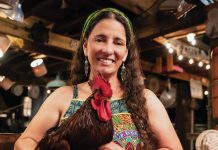At the Animal Cancer Care Clinic sprightly dogs bark messages to one another, tails wag and owners smile.
This place isn’t sad, drab or sickly. It’s anything but.
“Everyone thinks, ‘Oh, they must be so sick,’” says Dr. Stephanie Correa, who founded the clinic in 2004. “But they look normal – we take the nerves away.”
That normalcy and comfort is why Correa’s cancer treatment center has grown from one clinic in West Palm Beach to five clinics from Miami to Melbourne, plus a full-service cancer hospital in downtown Fort Lauderdale.
The clinic, which celebrated its 10th anniversary in January, is one of five animal cancer treatment centers in the nation and the only center serving the Southeast U.S. People travel from Florida, Georgia and as far as the Caribbean and South America to put their pets into Correa’s hands.
In the hospital alone, she treats 20 to 30 pets a day – mostly dogs, but occasionally she’ll treat a cat or a more exotic pet like a ferret or a rabbit. All in all, she’s seen more than 20,000 patients during her career.
The animal hospital, located on Northeast Fourth Avenue, could pass for a small, private hospital if it weren’t for the puppy portraits hanging on the brightly painted walls or the dark, swirling forest-green concrete floors that easily mask dog hair and the occasional accident. State-of-the-art CT scanners and radiation machines fill the rooms.
The high-tech equipment helps Correa practice her philosophy of “One Medicine” – the idea that both humans and animals benefit from the same treatments, research, applications and discoveries.
She works with a handful of talented oncologists and oncology fellows to develop and oversee treatment plans that include surgery, chemotherapy, radiation and palliative care – treatments that focus on relieving and preventing the suffering of patients. “It’s the same medicine as humans – just a different dosage,” Correa says.
And instead of administering treatments in hospital beds or wheelchairs, the animals receive their chemo and radiation lying on colorful rugs on the floor. “So they’re comfortable,” Correa says. An initial consultation costs around $120 and treatments range from $1,500 to $8,500.
Correa has more than a work relationship with the animal world – at home she has a golden retriever, a chocolate lab and three cats. Her father was also a veterinarian.
After completing a clinical rotation in New York following vet school at the University of Florida, Correa knew that oncology was the field for her.
“It’s ever-changing, fast-paced and there’s constantly new research,” Correa says. “I always wanted to be involved in the fight against cancer.”
The friendly blonde who grew up in Fort Lauderdale, says she also connected to the “client aspect” of oncology medicine.
“In oncology, you have to like that – that emotional bond,” Correa says. “You see these people every week.”
She says the hardest part of her job is the “unknown” – not knowing if a treatment will work or when the patient will go into remission.
That happened with Pompano Beach resident Bill Gilchrist and his pup Topper, a shaggy Polish lowland sheepdog. “He was having problems; he had a growth on his intestine and was bleeding out,” Gilchrist says.
The doctors weren’t sure if Topper would survive the lymphoma, but two surgeries and one year later, Topper is in full remission and about to turn 10.
“They saved him,” Gilchrist says, of Correa and her team of doctors. “He’s back to normal now.”











Facebook Comments